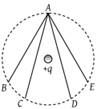In the electric field of a point charge q, a certain charge is carried from point A to B, C, D and E. Then the work done

1. Is least along the path AB
2. Is least along the path AD
3. Is zero along all the paths AB, AC, AD and AE
4. Is least along AE

A conductor with a positive charge:
| 1. | is always at +ve potential. |
| 2. | is always at zero potential. |
| 3. | is always at negative potential. |
| 4. | may be at +ve, zero or –ve potential. |
On rotating a point charge having a charge \(q\) around a charge \(Q\) in a circle of radius \(r,\) the work done will be:
| 1. | \(q \times2 \pi r\) | 2. | \(q \times2 \pi Q \over r\) |
| 3. | zero | 4. | \(Q \over 2\varepsilon_0r\) |
Two charge +q and –q are situated at a certain distance. At the point exactly midway between them -
1. Electric field and potential both are zero
2. Electric field is zero but the potential is not zero
3. Electric field is not zero but the potential is zero
4. Neither electric field nor potential is zero
In the figure the charge \(Q\) is at the centre of the circle. Work done by the conservative force is maximum when another charge is taken from point \(P\) to:

| 1. | \(K\) | 2. | \(L\) |
| 3. | \(M\) | 4. | \(N\) |
Two insulated charged conducting spheres of radii 20 cm and 15 cm respectively and having an equal charge of 10 C are connected by a copper wire and then they are separated. Then -
1. Both the spheres will have the same charge of 10 C
2. Surface charge density on the 20 cm sphere will be greater than that on the 15 cm sphere
3. Surface charge density on the 15 cm sphere will be greater than that on the 20 cm sphere
4. Surface charge density on the two spheres will be equal
Two equal charges q are placed at a distance of 2a and a third charge –2q is placed at the midpoint. The potential energy of the system is -
1.
2.
3.
4.
A particle of mass m and charge q is placed at rest in a uniform electric field E and then released. The kinetic energy attained by the particle after moving a distance y is -
1.
2.
3.
4.
How much kinetic energy will be gained by an – particle in going from a point at 70 V to another point at 50 V ?
1.
2.
3.
4.
If a charged spherical conductor of radius 10 cm has potential V at a point distant 5 cm from its centre, then the potential at a point distant 15 cm from the centre will be -
1.
2.
3.
4. 3 V






